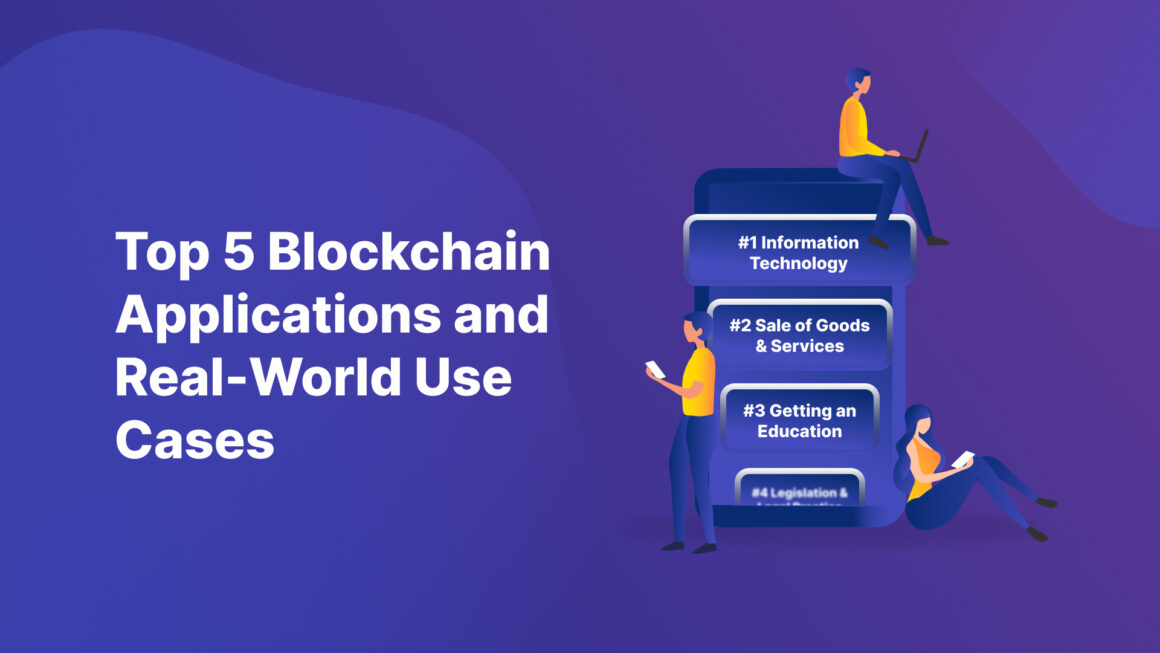Some people associate blockchain only with bitcoin and cryptocurrencies. In fact, blockchain is used to solve completely different issues, and it works much better than standard algorithms.
The number of areas where blockchain technology is used is limited only by the imagination of software developers. Moreover, they are not always associated with cryptocurrency. Let’s consider the most widespread blockchain applications and use cases in daily life!
#1 Information Technology
Blockchain was born thanks to information technology, the development of computers, and the global network. Therefore, if want to find out where blockchain technology is widely used, then you need to start with IT. The main direction in which blockchain can be in demand is to ensure data safety. In the modern world, they are the main value.
Local data storage on a PC is fraught with loss due to a breakdown or theft of the drive. A cloud option is not suitable due to the risks of hacking a server or destroying a data center. In addition, the classic cloud version uses one database with logins and passwords for user identification. Therefore, leakage and change of data are possible at different stages due to the human factor. Thus, the entire system will be poorly protected.
Blockchain, in turn, functions automatically. Blockchains are verified using built-in algorithms, and each network member stores all data. Therefore, hacking or destroying one node will not affect the entire system’s operation in any way. Authentication constantly occurs by checking the ‘neighbor’ hashes. Even if one element is fake, it will not pass verification and will be replaced with a genuine one.
The use of blockchain allows you to prevent interference in the operation of information networks rather than deal with the consequences. Moreover, functioning solutions are already widely used in the market.
#2 Sale of Goods & Services
International trade is an area of application where blockchain has almost unlimited benefits. It is considered one of the trends that will determine retail development over the next 10 years.
Large retailers have already paid attention to the possibilities of the technology. For example, Walmart, a popular megastore chain in the United States, is implementing blockchain to organize the purchase of goods outside the country. For this purpose, a special program was developed. It allows you to track the supply chain from the manufacturer of products to the supermarket. As metadata, the blocks will store information about storage periods, transportation conditions, and the manufacturer.
Information industry giant IBM is also paying close attention to blockchain. The company’s programmers are implementing a project aimed at controlling the quality of food products and improving their safety. They are already interested in retailers, as well as food manufacturers from around the world.
#3 Getting an Education
Blockchain provides guaranteed data safety. Transaction records are stored on all nodes, and they cannot be deleted or falsified. You can only add an additional block that contains replacement information. With the help of blockchain, it is possible to keep education and academic degree records. As a result, any participant in the system will be able to verify the authenticity of the document, its author, and the user who made the changes.
So far, blockchain is rarely used in educational institutions. But there are already examples. One of the higher education institutions in Cyprus uses this technology to store issued diplomas. The same institute accepts tuition payments in cryptocurrency. Now similar systems are being launched at MTI and the Open University in the UK.
#4 Legislation & Legal Practice
Due to the inability to change or falsify data, distributed networks can be used as a way to store legally relevant information — for example, contracts for the sale of real estate or works of art. It is also possible to fix the fact of transferring the right to dispose of intellectual property objects. A striking example of this use case is the sale of digital paintings using NFTs.
Already, databases with information about the owners of real estate and land plots have been digitized. But, for example, in Sweden, government agencies have gone further. This country is about to introduce blockchain, which will record transactions on property transfer. Thus, state regulatory authorities that determine the fact of transactions has access to it. This is how individuals or companies are identified whose income does not correspond to the amount of taxes paid.
#5 Medicine
Blockchain in healthcare facilities is an opportunity to make data processing simpler, faster, and more understandable. But the main obstacle is the low speed of data processing. When adding new blocks, information about them is verified by all nodes. Therefore, the procedure takes a long time.
Still, new blockchain algorithms with fast transactions can be the way out of the situation. For example, Healthureum (HHEM). Its peculiarity is that the data is stored separately from the blockchain. Blocks, in turn, contain only links to records. Consequently, this way, data synchronization will be much faster.
It is too early to wait for working solutions in the medical field. A limiting factor is a legislative regulation of patients’ personal data collection and use. Therefore, it is first necessary to adopt and implement regulatory legal acts. And then, you can use distributed networks in medicine.
Read Next: Why Is Blockchain Important: Why Use Blockchain Technology in 2022?
Conclusion
Blockchain can definitely be used in everyday life. The list of 5 areas where blockchain is used or will be used is far from complete. In addition to the areas listed above, this technology is in demand in the entertainment industry. For example, when making payments on online casino platforms or when confirming the authenticity of video clips, music recordings, and photos.

Leave a Reply